Trigger Warning and Disclaimer: the content you are about to read contains graphic and sensitive experiences. The opinions expressed in this piece solely reflect the author's views and not Andariya's. Reader discretion is advised. Please read our full editorial notice here.
Introduction:
The December Revolution was characterized by peacefulness, which was the slogan that was raised, sung and chanted at the top of the throats, and despite the excessive violence that was used against the peaceful protests, this violence only increased the demonstrators' adherence to peacefulness.
April 6, 2019, was a historic day, as finally, after months of demonstrations, the Sudanese people were able to reach the General Command of the Sudanese Armed Forces in a move that was intended to entice the emotions of the armed forces to side with the citizens against the authorities in an attempt to turn the wheel of history back to the revolutions of October 1964 and April 1985.
The revolutionary action bore fruit, and former President Omar al-Bashir was removed on April 10, but the joint agenda between the Sudanese Armed Forces (SAF) and the people did not last long, as the sit-in was quickly massacred with excessive force by a joint force, one day before Eid al-Fitr and amidst a very large media momentum for the gathering to perform the Eid prayer at the sit-in site.
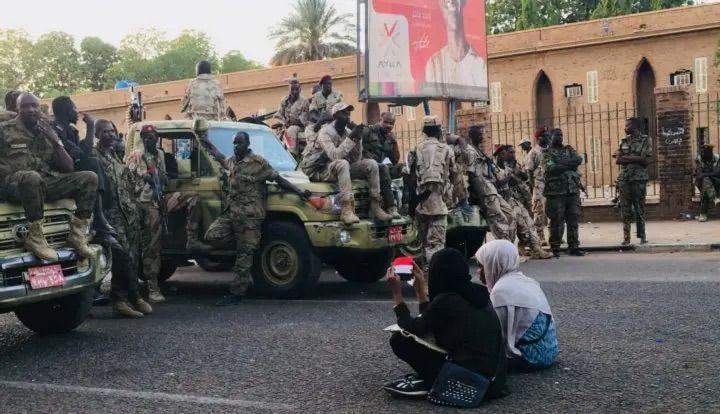
Women block the road to army vehicles during the revolution. Al Ishtraki source
On July 5, 2019, an agreement was signed to form a consensus sovereign council between the Transitional Military Council and civilian candidates nominated by the Forces of Freedom and Change Alliance (FFC). However, since the announcement of the council and the formation of the transitional government headed by former Prime Minister Dr. Abdullah Hamdok, the political scene in Khartoum has remained tense between the hopes and ambitions of the military forces for power, wealth and sovereign ambition and the political tug-of-war between politicians. Finally, the transitional government was overthrown in a military coup on October 25, 2021.
After more than a year of trying to restore the path of democratic transformation in Sudan, the Sudanese woke up to the sounds of war, which they thought was a temporary event that would soon pass, but the nightmare continued after 19 months in which the scales have been turned, and the options have become nil for millions of Sudanese trapped in conflict areas or threatened by the arrival of war to them. This prompted many of the youth to mobilize and join the recruitment camps of the armed forces, which were called for by the Commander-in-Chief of the Armed Forces amidst the support of the traditional forces in the various regions under the control of the Sudanese army.
In the article below, we review the stories of some of the individuals who responded to the call and joined the training camps. The article is written in the form of stories told by the individuals themselves and based on interviews conducted by the writer with the storytellers.
Story (1): The Second Call
On June 27, 2023, Al-Burhan, the acting commander of the armed forces, issued his second statement since the outbreak of the conflict on April 15, in which he called on the youth of Sudan to take up arms and join the Sudanese army to defend their country. This was the second national call that I responded to.
The first call was when I was 16 years old, the call of the Sudanese revolution. At that time, I put down my school notebook from my hand and went out among the people carrying the taras _bricks used to build walls that would stop forces from attacking the demonstrations and chanted freedom, peace, and justice. Even though my perception of the three concepts at the time was limited due to my young age, at that time, I, who was still in high school, took it upon myself that I had no identity other than a revolutionary.
On June 27, I was at the neighborhood club with my three friends, waiting for Al-Burhan’s speech. At that time, the conflict that had started in limited areas in the center of the capital, Khartoum, had spread to almost the entire capital, except for scattered areas in the city of Omdurman. Darfur was bleeding, and Al-Obeid was besieged. We felt extremely helpless at the time, and the call was our salvation from this helplessness.
Before the war, I was a computer science student on the verge of graduation. I am the eldest of my siblings, and my mother has been waiting for my graduation day since I was born. After the outbreak of the war, we had nothing left but our home. There were no ways out; therefore, I had to defend myself. I would not stand helpless in front of my family. In any case, I was in the midst of destruction, so why should I stand by and watch while death is my destiny?
Two weeks later, I joined the nearest mobilization camp with my three comrades and began the journey of transformation from a civilian who had never seen a weapon up close to a mobilized person in open warfare.
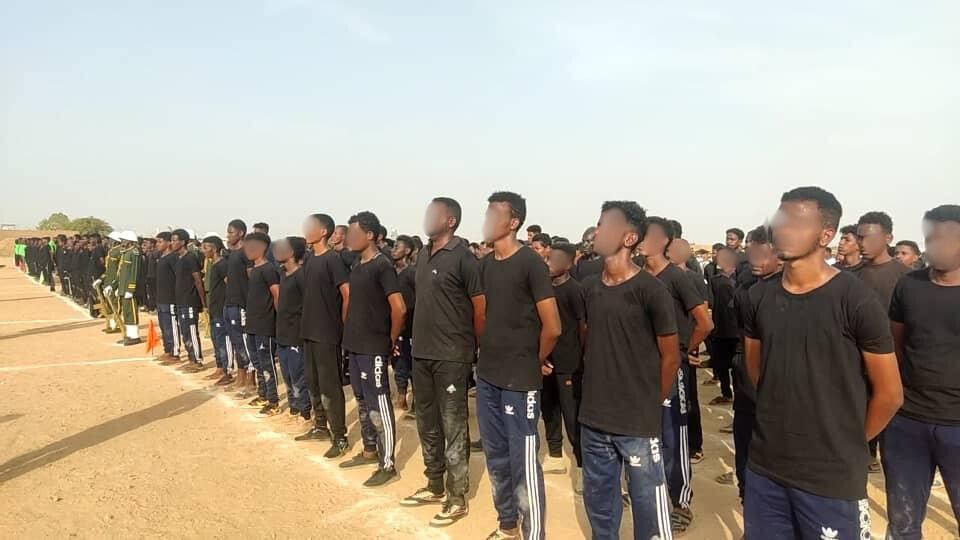
Mobilized citizens in Marawi, Northern State. Source: Sudan News Agency
We started with physical training and then moved to carrying weapons immediately after five days, then we were transformed into a reserve force for several weeks. Within thirty days, we were on the front lines. I remember my feelings at the time; it was not fear as much as it was injustice and revenge, driven by adrenaline inside me. The battle began violently, and people were killed. I was overcome by a feeling of guilt that even that injustice could not explain, and it did not leave me for a long time.
Over time, I trained on various types of heavy weapons, and naturally, I got used to scenes of violence. I participated in several direct confrontations. I would go out with my three comrades, and we never parted, together in the battalion, the dorms and even the battlefields.
The hardest confrontations were when my comrades and I were surrounded by more than fifty individuals. To this day, I do not know how we survived, but I am always confident that if I die, they will carry me, and I will not remain abandoned there. We went out together and advanced the ranks, as in the December Revolution "for the sake of Azza” _a metaphor for Sudan_ to achieve the dream of the new Sudan that we drew and believed in.
Armed citezen
22 years
Khartoum
Story (2): Suaad
I live in one of the villages in the northern state where life is monotonous and runs on two parallel lines: women and men perform duties that never meet. The scales turned upside down after the outbreak of the war as the universities closed their doors; the university was my only window to the world. Then, we were busy receiving family and friends coming from Khartoum and the rest of the areas affected by the war. Some of the newcomers were girls my age, and we quickly became friends, spending time together and cooperating in responsibilities such as preparing meals and tea and washing dishes.
One day at sunset, the Commander-in-Chief of the Armed Forces issued a statement calling on young men and women to mobilize, we did not care about it because none of us cared about the details of politics. A few days later, my cousins joined the village camp. They ran in crowds and chanted enthusiastic songs every day passing by our house, and the girls and I would climb the wall stealthily and watch them with enthusiasm.
A few months later, I found an advertisement for the opening of mobilization camps for women. The first thing that came to my mind was finally something different to do to break the monotony of life. I went on negotiation rounds with my mother, who strongly refused, saying that this might threaten my future motherhood and that there was no place for women on the battlefields. “Why would you be involved in men’s work?” she said. At the time, there were no fears that the conflict would spread to our areas, as we were geographically isolated from what was happening in the middle.
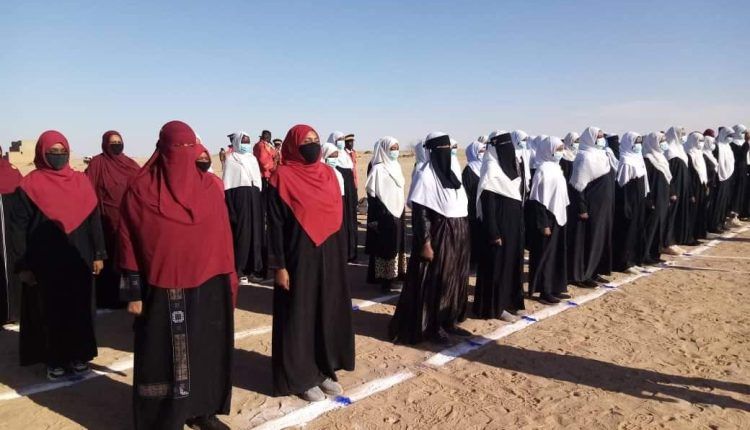
Graduation of the second batch of mobilized women in Merowe, Northern State. The leading source
After the fall of Madani, the situation changed, and the threats of the fighting reaching the north increased. I was following what was happening and thinking about what would happen to us if the conflict reached us, how the situation would become with the loss of homes, lives and honor. I began to take the details of the mobilization extremely seriously, stemming from the fear that overwhelmed me, as I am the only girl to my parents, and we only own the house we live in, and there are no travel options available to us, which paved the way for my family to accept my joining the training camp.
I wake up early to do my chores as efficiently as possible and then rush to the camp after lunch. We started training on physical movements, which took a long time. Recently, we got to carry a weapon and how to identify targets and shoot.
I may not be sure of my ability to fight if my fears come true, but I am certain that I will not stand by and become a victim. I may not even need to carry a weapon to defend myself and my family due to the support and security provided by the young men of my family and the village community. Despite that, I am determined to be able to protect myself and my parents if necessary, and this motivates me daily and reassures me.
Suaad,
19 years old
Armed citezen
Al-Shamalia
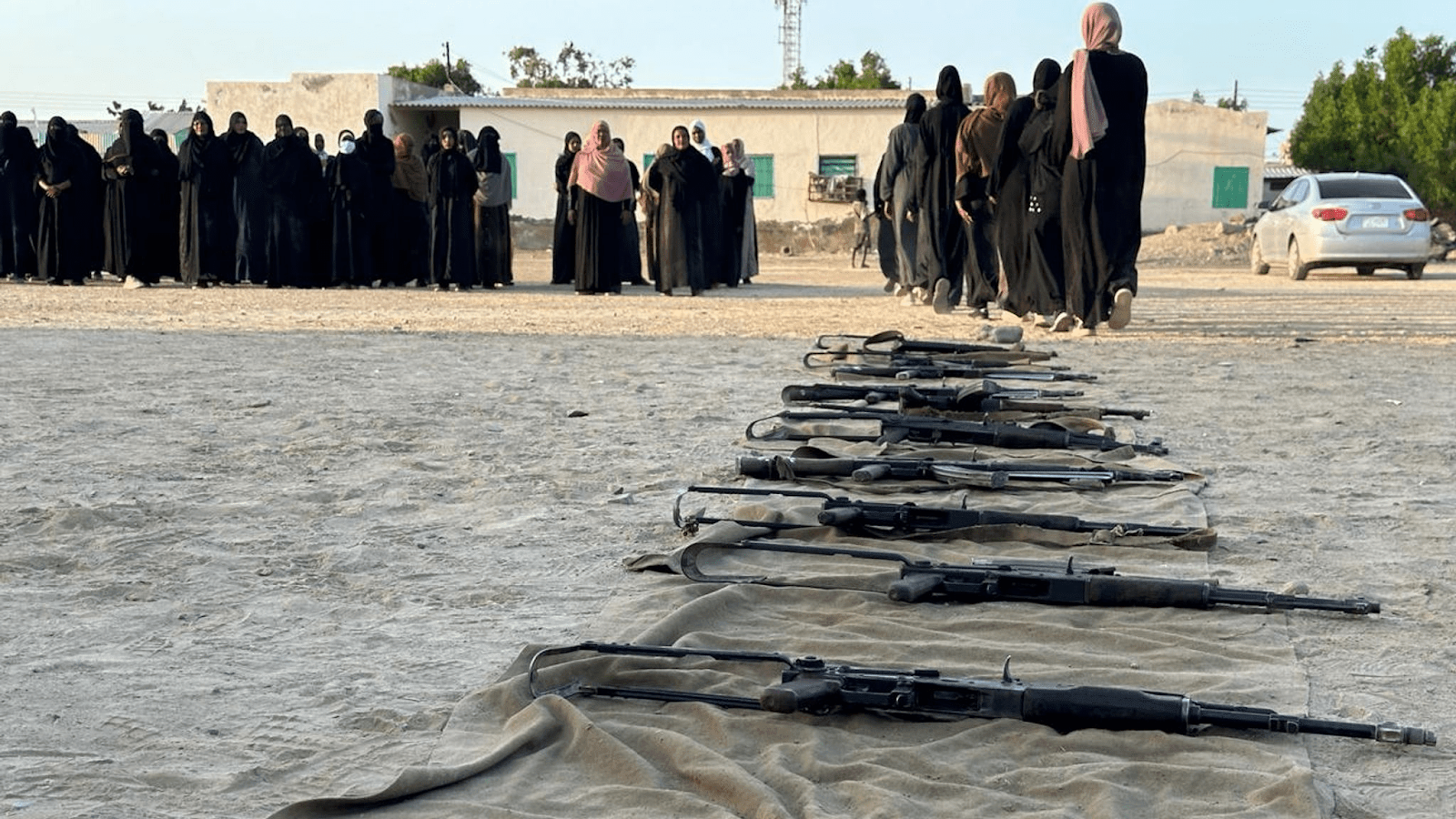
Ready weapons for women to train on. Source Sky News
Story (3): The Radio Speech
The radio broadcasted a speech by Al-Burhan. I heard it in one of the places where men gathered in front of the house, and I ran out, I don't know why, but I knew that it was the beginning of another disaster, after eight months of war, we had built stability from nothing in a new place chosen according to the criteria of being only far from the conflict.
The disaster began with the news of the attack on Madani; we thought it was another scenario from the siege of El Obeid, repeating that the army would not allow the fall of an important city that includes an estimated 5 million displaced people. The fall of Madani into the hands of the Rapid Support Forces (RSF) caused another humanitarian disaster, more deaths, more displacement, and more loss of everything, for some for the second time, as if we were witnessing the outbreak of war again, with the same pain and suffering.
What followed those events was a general frustration that swept everyone as we realized there was no return, the war would not stop soon, and survival would be for the strongest. I was in one of the cities in eastern Sudan, technically the next target for the expansion of the RSF. Panic swept the place, and the reaction of the citizens was for everyone carrying a weapon in the area to prepare to fight.
The tribes came out in processions displaying their weapons and men, firing into the air to demonstrate strength and control, which became a common scene, while people came out in delegations to greet the processions and cheer enthusiastically.
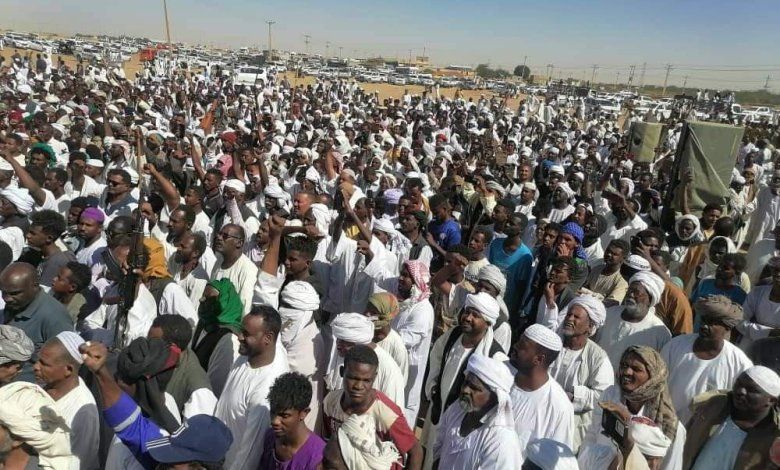
The mobilized citizens in Kassala, eastern Sudan, announced their readiness to support the army. Source: Tasamoh News
Before, children especially those who witnessed the events in Khartoum were deeply affected by the war, their games revolved around weapons and fighting, with time and manifestations of armament, they began to ask to carry real weapons, and the displaced children felt discriminated against because they saw the children of locals carrying weapons in their processions. While in Khartoum, children make weapons from cardboard and metal cans. My young nephew left the country as soon as the fighting broke out, and we thought he had escaped the fever of armament and scenes of violence, in one of the art lessons at school, he drew a picture of a burned house, a dead person lying on the ground and a person standing among them holding a weapon.
On the same day, my younger brother (twenty years old) came to me and told me about his decision to arm himself. He registered his name with the rest of the neighborhood youth to receive their weapons. I was shocked by his decision, and we quarreled. I think he is young in age and experience, and carrying a weapon and fighting requires many years. He will not tolerate war, and we will not tolerate it in him.
I was more shocked by his motive, saying that he would not stand helpless and watch his money and honor get violated again after Khartoum. I am saddened by the injustice and anger that the war has generated in the hearts of young people.
Rehab,
30 years old,
Citizen
Eastern Sudan
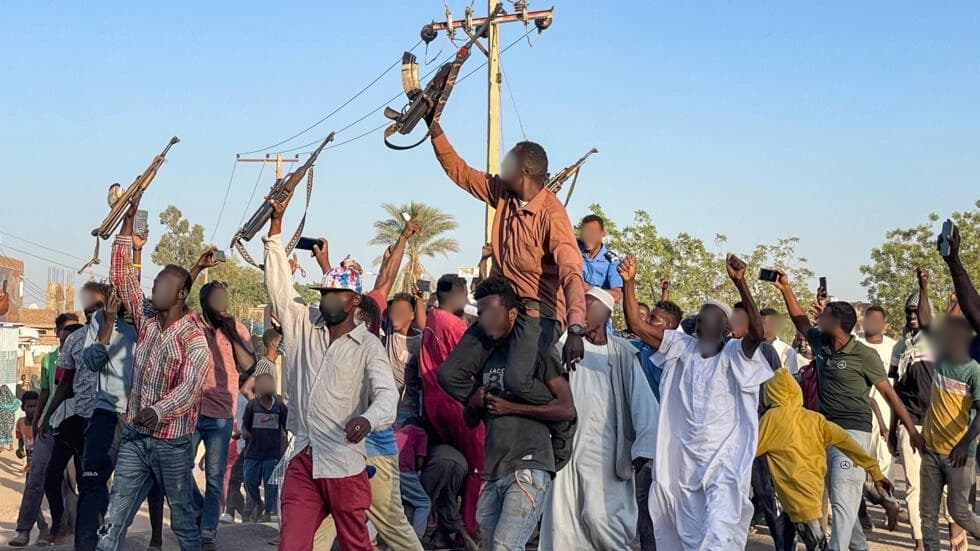
People gather to support the Sudanese army in Wad Madani on December 17, 2023. © AFP
Story (4): Sixty and Diabetic
My story may be different, but it represents many; I am sixty years old and diabetic. I know that carrying a weapon will not protect me and will not extend my life beyond my destined age, but I am angry, and my heart carries enough injustice that exhausts me. I also know that it will become an unequal war.
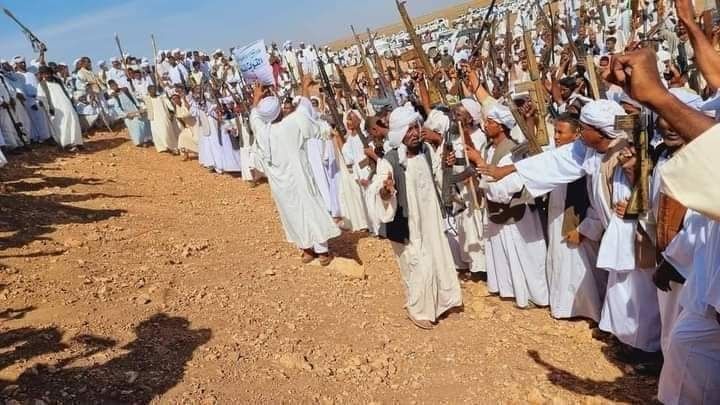
Popular mobilization in White Nile State. Source Sudan Tribune
I see that there are no options available, and we have been forced into this confrontation. Even if our military experience is absent or little, and even if our main motivation is anger and injustice mixed with fear, I believe that my possession of a weapon may provide me and my family with a kind of reassurance and protection that we have lost.
Mukhtar,
60 Years
Armed citizen
White Nile
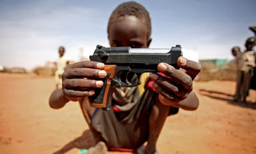
A child holding a small weapon. Source The Guardian
